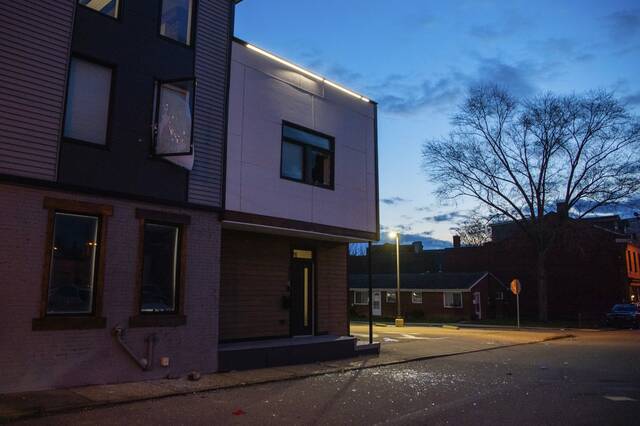“It was a war scene.”
This is a short statement, but it is vividly, viscerally descriptive of the violence that erupted on Pittsburgh’s North Side in the early-morning hours of Easter Sunday.
Almost 100 gunshots — half fired inside a home by the corner of Madison Avenue and Suismon Street, half from the street outside. Hundreds of people, mostly teenagers, running through the streets. Windshields and windows showering glass like sharp confetti.
Two teenage boys dead. Eight others shot. Five more injured in the confused flight.
This is something that should never happen on a holiday weekend when people are celebrating with family. It’s the kind of thing people like to believe doesn’t happen in their neighborhoods or cities at all. That happens in New York or Chicago. If it happens in Pennsylvania, it happens in Philadelphia.
But the truth is that random gun violence is not something for other people to handle. It’s something that can reach out and touch any community.
It is something that has become shockingly commonplace. The Gun Violence Archive lists 87 incidents that occurred Sunday. While the Pittsburgh shooting was the largest and most deadly, it is almost more depressing to see how regular shootings with one or two injuries pop up with clockwork regularity on the list. New Orleans. Dayton. Detroit. Jacksonville. Over and over.
They happen in our backyards so often that even the news of a shooting attracts attention only when something more than the everyday “one hospitalized” occurs. Like a Hollywood blockbuster that has to up the stunts for the sequel, the regularity of the violence can make what was once horrible seem like a fender bender.
“Sharing collective grief and wondering why and how shootings keep happening has become a weekly routine. It saddens and infuriates me to see gun violence being talked about as an inevitable part of the American way of life, when this is one epidemic in our nation that is entirely preventable,” said Nicole Hockley, co-founder and CEO of Sandy Hook Promise, who lost her son, Dylan, in the 2012 Newtown, Conn., shooting.
“Shootings are not simply statistics to be analyzed — they are born of pain and create endless trauma. Every life taken by gun violence is precious. The physical and emotional scars of surviving a shooting never really heal.”
Hundreds of people survived the Easter Sunday shooting. Not just the kids who ran bleeding through the streets, their blood streaked along parked cars. Not just the police who have to carry the trauma of one shooting into the next call to which they respond. This involved the neighbors who were plagued by the party. The downstairs tenant of the Airbnb who abandoned the house with his kids earlier in the night because of the chaos. The tenant of a nearby house who had a bullet hit her bed.
The survivors are more than just the ones strafed by bullets. They are the whole community.
“It is critical that we come together now to help reduce the violence currently happening while we begin to do the long-term work of ending the culture of violence that is enabling the senseless loss of life we are experiencing today,” said Pittsburgh Mayor Ed Gainey.
It has been critical for a long time. It is past time to address why this violence occurs, why it grows and what to do about it.








